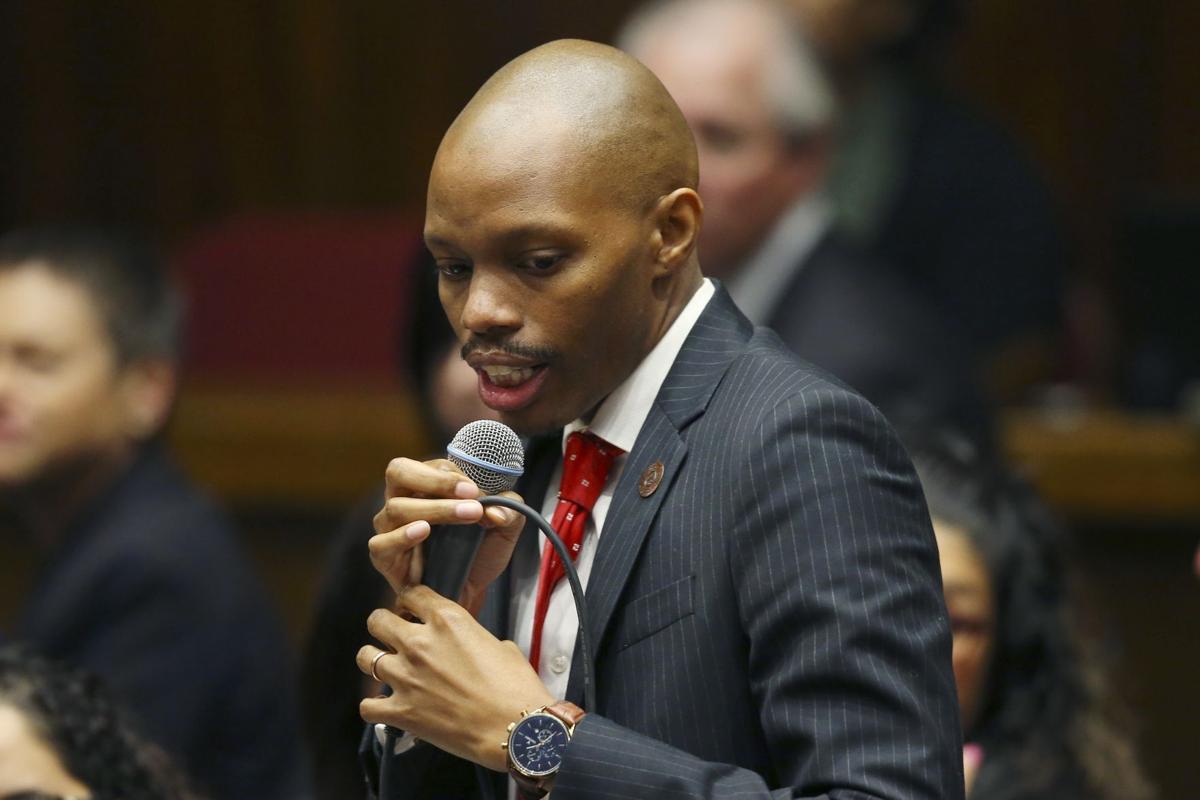With Republicans at a stalemate, Gov. Doug Ducey said Wednesday he’s willing to work with Democrats to cobble together votes for a state spending and tax-cut plan.
“What’s important to me is that we get the budget that I presented — or as close to it as we can — over the finish line,’’ he told Capitol Media Services. He said his door is “always open.’’
That potentially paves the way for Democrats, who have been kept in the dark while the governor and GOP leaders crafted their proposal, a chance to have some input in exchange for needed votes.
And there may be room for a deal.
House Minority Leader Reginald Bolding, D-Laveen, said there may be some wiggle room, even on the idea of cutting taxes. It all comes down to details.
“I couldn’t tell you specifically whether or not we would support a tax cut in addition to additional revenues until we look at the plan,’’ Bolding said. “We won’t negotiate in isolation. We’ll look at the entire plan and what the trajectory looks like.’’
Ducey, who is championing a $1.9 billion tax cut and creation of a flat tax rate, said even that could be negotiable.
“That’s part of the deliberation process,’’ the Republican governor said. “And, typically, as we begin moving forward, the debate happens, the deliberation happens.’’
But Ducey won’t say how much he is willing to give to line up the votes. “I do not like to have those deliberations in the press,’’ he said.
Working in favor of the Democrats is that there is at least one GOP holdout in each legislative chamber unwilling to support the $12.8 billion spending plan and the $1.9 billion in permanent tax cuts the governor is pushing.
In fact, neither the House nor Senate have plans to try to vote on any part of the package when lawmakers reconvene Thursday, June 10.
About the only thing the Senate intends to do is start the process of seeking an override of the 22 bills Ducey vetoed two weeks ago, miffed that lawmakers recessed for two weeks when a budget deal first fell apart.
Senate President Karen Fann, R-Prescott, said that’s the nature of Republicans having a bare majority in both chambers. “It’s a challenge when you have 31 and 16,’’ she said, referring, respectively, to the GOP membership in the 60-member House and the 30-member Senate.
That gives every Republican member leverage. “It creates a very tough working situation,” she said.
Ducey said he’s going to engage with Rep. David Cook, R-Globe, and Sen. Paul Boyer, R-Glendale, whose votes he needs — but does not have — for the plan.
“We have some very thoughtful legislators that care about certain things,’’ Ducey said when asked about the two GOP holdouts. “And I want to understand what’s important to them and make sure they understand what’s important to me and make sure we have a successful budget.’’
But it isn’t as simple as getting Cook and Boyer on board. Fann said if they get some of what they want, that could result in the loss of other Republican votes.
That is what could give Democrats a seat at the negotiating table.
On the spending side of the ledger, Bolding said there are “critical gaps with our infrastructure,’’ and he is seeking more money for housing for the needy, COVID-19 relief and education.
“As long as we can do those things and create a plan that works for everybody, we are willing to engage,’’ he said. “At this point, everything is on the table.’’
Well, not quite.
Bolding said the proposal to create a single 2.5% individual income tax rate for all Arizonans regardless of income is a nonstarter. That would scrap the current system of four brackets, ranging from 2.59% for couples with taxable income up to $53,000 a year to 4.5% on taxable earnings above $318,000.
Also non-negotiable, Bolding said, is the plan that he said undermines Proposition 208. Voters approved the proposition in November to put a 3.5% income tax surcharge on the most wealthy — meaning those with income above $500,000 for married couples — to raise upward of $800 million a year for K-12 education.
Strictly speaking, the budget plan wouldn’t repeal that levy, as lawmakers are powerless to overturn the initiative. But the GOP proposal would create an absolute cap of 4.5% on all income taxes, including that surcharge.
The proposal does require the state to “backfill’’ any lost revenues for schools. But Bolding said using other state revenues to do that effectively undermines the initiative. “Proposition 208 clearly stated that these additional dollars were not to supplant (state revenues),’’ he said.
“They were supposed to be additional, supplemental resources,’’ Bolding said. “If we are shrinking our state budget, we are going to provide less funding into education, with education being the largest portion of our budget.’’
The minority leader also said the claim by Ducey of being willing to work with Democrats rings hollow, at least right now.
“We obviously have reached out as we know that the state is facing a fiscal cliff in the next few weeks,’’ Bolding said.
The new budget year begins July 1, and there is no option in state law to keep the government operating in the absence of an adopted spending plan.
“But we have not been engaged up until this point,’’ Bolding said, saying Democrats have contacted “the highest staff member in Gov. Ducey’s office,’’ meaning Chief of Staff Daniel Scarpinato.
Ducey acknowledged he has been distracted from what’s happening, or not, with the budget.
“My top priority right now is the Telegraph Fire and the Mescal Fire,’’ Ducey said, having issued a declaration of emergency earlier Wednesday. “We’ve got to do all the things that are appropriate to that and make sure they have the resources and appropriations as well.’’
As to enacting a budget and tax cut, he said he remains “optimistic” but “we’re just not there yet.”





